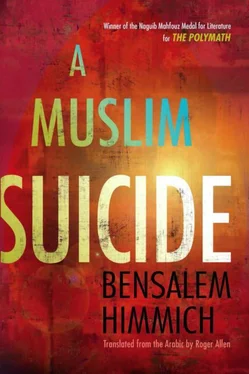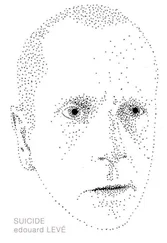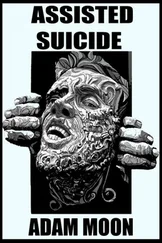I needed some fresh air!
To find it I rode on horseback alongside the seashore, then into the foothills. My mind was still overflowing with all the events that had happened in the months of Rajab and Sha`ban (which was about to end), some of which had been of major import, affecting the way of life I was currently experiencing: my letter to King Frederic, my truncated lesson in the mosque, 'Abla's marriage and the end of my enforced misdeeds, the meeting with Ibn Khalas in his retreat house, and Hafsa's illness and eventual death. It's time to bring your soul to account, I told myself, and seek some seclusion. What better month could there possibly be than Ramadan, which was about to make its appearance in the sky above?
I turned off toward the mosque in order to spend some time thinking and then perform the evening prayer. No sooner had I completed my ablutions than I found myself surrounded by a group of men, both middle-aged and young, who asked me to hold a session before the call to prayer in the private part of the building so they could be enlightened and enhance their feelings of love toward me.
"There's not much time," I said after thanking them for their sentiments. "All I can do is to rehearse for you the various statements about fasting in the marvelous month that is upon us."
"Esteemed teacher," replied one of them, fully supported by those around him, "we all know by heart the statements about fasting, as well as the different views on ablutions and preparing the dead for burial. We would prefer to hear about the opinions you are supposed to have, that philosophy can serve as a solid base for thought and that Sufism provides a clear sense of direction, both of them uniting as they blend and vanish into the waters of monotheistic belief."
"Is everything that exists known?" asked a second. "If there is a clear contradiction between reason and tradition, which of the two do you choose? Does everything that is known exist, even though it is not referred to in scriptures?"
"Can you confirm or deny the rumor," asked a third, "that you agree with Ibn Hazm of Cordoba in his opposition to Imam Malik ibn Anas and his assertion that the decision of the people of Medina to adhere to the Malikite tradition is a mere case of fanaticism, or, to cite his own words, stupidity?"
"God Himself speaks through the voice of the Queen of Sheba," a fourth of them now said. "She said, `When kings enter a city, they corrupt it and debase its senior citizens. That is what they do.' Do you apply the import of the verse to the rulers of this era of ours, Al-Said, Commander of the Faithful, among them?"
"And what about this hadith," asked a fifth, "After me will be thirty years of the caliphate, and then it will turn into a nasty monarchy'?"
The majority of these questions had me smelling a rat. "Even if we were to sit down," I said in order to put a stop to the apparent flow, "there would be no point in giving short answers to your questions. The only way of dealing with this is for the warden of the mosque to bring permission in writing from the governor. If that happens, I will schedule a series of sessions with you. After each question has been duly assessed, it will deserve a separate session that will be held between sunset and evening prayers. God alone shows us the proper path."
These questioners and others insisted that I give them answers, even if it was after the prayer. The whole thing turned into a noisy debate. The warden came rushing over and asked what was going on. After listening to what the questioners had to say and then to my request for written permission, he gave a reply that strongly suggested collusion. "No, no, master," he said, "a major scholar such as yourself doesn't need any kind of license. So give them the benefit of your wisdom and do not stint in responding to your questioners."
Once he had had his say and gone away, I soon realized that the whole thing was a trap. While I was still making up my mind about what to do, I found myself surrounded by a group of young men, one of whom whispered in my ear that they were friends of my Andalusian students. He then shouted to the gathered assembly that they should wait till the prayer was concluded and then something would happen. When the call to prayer came, everyone entered the mosque, but my rescuers lagged behind. They confirmed that my suspicions were correct, in that a group of practicing jurists had hatched a plot against me and were inciting fundamentalist people against me. They accompanied me to where my horse was tethered and strongly suggested I go home. That is exactly what I did.
When Fayha' came to greet me, I was still looking very worried. She asked me if anything bad had happened to Hafsa, and I told her what I had found out about her and what I had done. I made a particular point of the fact that it was absolutely forbidden to visit her grave. She burst into tears and prayed that God would grant her repentance and thereafter forgiveness.
AS RAMADAN BEGAN, I confided in my wife that I intended to spend most of the blessed month in my retreat on Jabal Musa. She acceded to my wishes, pointing out, as she put it, that she wanted me to feel happy and serene. Next day at dawn my baggage was packed on my horse, and every member of the household was there to say farewell. I hugged Fayha'. "Just remember," I whispered in her ear, "that you are what has replenished my eye and my soul!" With that I entrusted her to the two servant-women and Hamada, then got on my horse and rode away.
When I reached the mountain zawiya, the warden, 'Abd al-Barr, gave me a warm welcome. He allowed me to choose between two rooms in the wing dedicated to silence, and I selected the one that was better lit and quieter. I explained to him the principal purpose of my month-long stay and asked him to take on whatever necessary chores I had. He understood me completely, but postponed answering my questions about the general state of the zawiya and its facilities and went on his way.
In my baggage I was carrying books that would suit the time and place, the most apposite of which was probably Al-Tawhidi's Divine Signs and Spiritual Breaths. The sessions that I had previously devoted to a perusal of this masterpiece and his other work had served as my own introduction to the rainbowlike beauty of their contents. The sense of harmony that they offered had broadened more and more, crystallizing in their author's statement that "worship of God as one is the very life of the soul," and in his supplication where he says, "0 Thou within whom everything is one and existent in everything."
This mode of access that you have provided, Abu Hayyan, is no matter of "incoherence" or illusion, nor does it result from a conscious fatigue. To the contrary, it comes from experience and experiment, involving the need to write in the very hardest of circumstances, just like the poet al-Mutanabbi, only more so. You suffered through an era of great turbulence, enough to bring tears to the eyes. You made your living by being a copyist, dismal trade that it is, and as a guard at the 'Adud al-dawla asylum. Scoundrels robbed your house, and the authorities and pseudojurists of the time declared you a heretic, evicted you, and showed you their contempt. When your despair was at its very height, you decided to burn all your works in case you and they fell victim to the corrupt times in which you were living or came into the clutches of frivolous fools and phony scholars. Your justification for doing such a thing provides me with a spark of initiative, a cogent argument, namely that you are that "strange person," one who "when he recalls the truth, he is abandoned; when he is called to the truth, he is upbraided; when he holds firm, he is called a liar; and when he manifests himself, he is tortured." If only the people who drove you out and tortured you had any knowledge of the true nature of knowledge and appreciated your genuine worth, they would have rolled in the dirt at your feet and covered their faces in dust, begging your pardon and forgiveness.
Читать дальше












